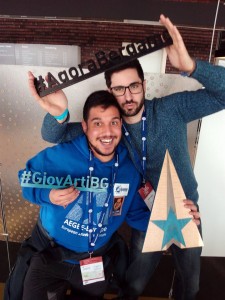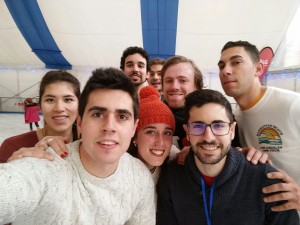Pablo Hernandez Rodriguez is currently External Relations Director and he decided he wanted to continue his work for AEGEE by running as President. He has a Master Degree in Law but, as he think that ” AEGEE as a European Students’ Forum should keep the student perspective”, he is studying a second master in European Affairs. He will turn 25 in June and is from AEGEE-Alicante, but he studied also in Thessaloniki, Greece. Here is the question you asked.
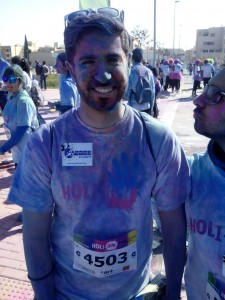 In your candidature you say that you were in charge of myAEGEE and it still needs to be finished. Who will do it?
In your candidature you say that you were in charge of myAEGEE and it still needs to be finished. Who will do it?
MyAEGEE is a project that has been running in AEGEE for several years already. From the most recent history, Pavel Zbornik coordinated the part of the project were the discussions on the structure were held and he put them into strategic documents that have been taken over by the following CD responsibles. Last year Paul Smits and his team had to find someone to transform the papers into reality, so Fabrizio Bellicano was the one in charge of development of the founding of MyAEGEE. This year, my team and I have had to develop the part of the project that is visible to members, still counting on Fabrizio and other developers to do it. Pavel is still very involved in the development of MyAEGEE in order not to repeat the same discussions and to move forward as fast as possible.
According to the timeline that we proposed, we still have some time to continue working on the project before finishing our cycle. Once the first version of MyAEGEE will be released, the next chapter will open with the objective of making improvements to it. For that another developer and project manager will have to be found. If I’m elected I will be able to give full continuity to the project.
You wrote that you want to focus on knowledge transfer (KT) for the members. How as president would you be able to put it into practice?
When I referred to training and knowledge management, I was referring mainly to the fact that the time a person stays in the organisation is very limited, so that once that person has learned and luckily has performed in some position, this person leaves without, in many cases, passing the knowledge on to the next generation. This is a structural problem of a student-based organisation that, in my opinion, can be tackled by improving the amount and quality of our trainings, by using the already available resources (as the board roles KT) and by focusing on the validation of non-formal education.
The role of the president in this sense has two sides. First, regarding the internal side I (my team) would work together with the Academy to develop quality materials to be implemented in the Local Training Courses (LTC) that the antennae have to organise, the existing guidelines would be promoted and a task force would work on validation of soft skills in AEGEE. Second, regarding the external side, AEGEE has the duty to advocate for its main principles and in this sense, it should get more involved in projects and activities shaping the validation and certification of soft skills.
The Corporate & Institutional Relations Committee (CIRC) has not been active for a long time now. You said that the Committee will be in charge of the FR, how would you gather new people who are able and are interested to work in it?
I have to say that the CIRC is working really well for some months already. Mainly under Ander’s coordination, they are managing to undertake some challenging projects and the meeting in the house that they will have the weekend before the Agora will help them to keep doing a good job. Anyhow, new people is always needed in every AEGEE body to ensure sustainability and proper knowledge transfer so a recruitment campaign will have to be carried out.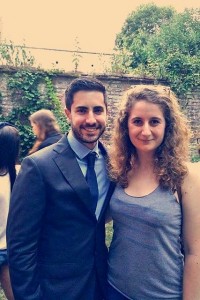
How would you establish an online representation system? Who would take care of the technical realization? How much could it cost?
The pilot of the online representation system will be developed by the current Comité Directeur which means that next year we will be able to analyse and develop it further. The intention is that every local will not need to wait until the Agora to express their opinion on a certain topic but that the Comité Directeur can ask directly a remote delegate to give the opinion of his or her antennae. The results should be considered as not binding, but consultative so by the end of the term the Agora is able to judge better the performance of the Comité Directeur based on the attention paid to the answers. The idea is currently under development, so I’m unable to get more technical right now. Regarding the cost, we don’t expect it to have high human resources cost and zero financial costs.
How quick do you answer e-mails?
As the main communication channel among the different members of AEGEE, the e-mail communication has to be a top priority for all the board members. In my case, I try to stick to the rule that I use also for this year of answering within two days unless there is an event or any other cause that stops me from checking them.
Last year, you stated “I would like to strengthen the cooperation with other NGOs like ESN, BEST, AIESEC and JEF”. Can you tell us if this has happened, and if yes, in which sense?
To write in detail all the cooperation we have had with these organisations would be too long, so I also encourage you to drop me an e-mail once the activity report is sent to give more details in each case. In general, this is the status:
- With BEST our cooperation is excellent. They are attending our events and we are attending theirs. This year we have also co-organised trainings under the umbrella of the QUAT project.
- With ESN we are supporting each other in the development of our networks. In a practical example, they got a grant that AEGEE may be able to get in the future and they have helped us in understanding its terms. We also collaborate for the Structured Dialogue, the participation in the Exchange Group of the European Youth Forum and in other occasions such as in the incident with the bus in Tarragona recently.
- With AIESEC and IAESTE we are building up our collaboration and they have participated in some of our activities as the Stakeholders Meeting organised under the MY-WAY project.
- With ESTIEM we are formalizing a collaboration agreement based on training, employability projects and co-organisation of activities.
- With JADE we are finalizing an agreement based on dissemination of activities, participation in events and co-organisation of online courses.
If you could only make one big change in AEGEE’s current state, what would you want it to be and how would you contribute to it in the position you are running for?
The most important change that we have to face is to give added value to our current activities to improve our impact and our outreach. This is of course based on many small changes that AEGEE should do, for example developing a consolidated Secretariat to take administrative work out of the rest of the bodies of AEGEE, there should be an improvement of the training and knowledge management and of course, a development of a clear policy and advocacy strategy, etc.
The role of the president of this differs from topic to topic, for example in the implementation of the Secretariat strategy I would contribute, because I have experience in grant writing. In regards to policy and advocacy strategies, the president has the main responsibility of making AEGEE be heard externally and to put together the opinion of the network in the different aspects. In this sense I also have experience, as I was Policy Officer for 2 years, and this year I’m in charge of the coordination of the policy and advocacy activities carried out by the policy officers.
What part of your task did you manage to accomplish and fully fulfill during this year?
My portfolio, as any of the portfolios of my team mates, is quite large. After nine months in the office, there are some objectives that have been achieved and others that will be achieved by the end of the term. The full activity report will be presented at the Agora, but as an example, the objective of the team was to pilot the AEGEE day and some days ago we say more than 75 locals organising activities related to this project.
In your opinion, how can the network check and control the democratic processes and decisions of the CD ? To ensure that they are not based on your personal opinion, but that you try to be as objective as possible and take the best decision for the network and not for you. What is your plan to improve transparency for the CD?
My plan is to give continuity to the work done by the current CD and add some new ideas. For instance, as mentioned before, the remote representation system is one of the possibilities we have to bridge the gap between the CD and the locals, so in case of having to make a decision, the network can be asked about it, to better understand its opinion and take it into account.
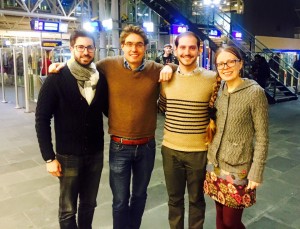 Another idea, that I consider very positive, is to have time during the events to ask the CD about different issues that are of interest for the members. For example, during the Agora we will have a session to be more detailed in our activity reports allowing all the attendants to ask us direct questions in a more cozy atmosphere. As a complementary transparency habit, I would want to encourage the drafting of strategic documents to be implemented by the Comité Directeur, so we have a direction approved by the Agora and not just the direction set by ourselves for a various range of issues. As an example, this year I’m developing the White Paper in IT services, so the members have the possibility to influence how they want the IT services to be in the future.
Another idea, that I consider very positive, is to have time during the events to ask the CD about different issues that are of interest for the members. For example, during the Agora we will have a session to be more detailed in our activity reports allowing all the attendants to ask us direct questions in a more cozy atmosphere. As a complementary transparency habit, I would want to encourage the drafting of strategic documents to be implemented by the Comité Directeur, so we have a direction approved by the Agora and not just the direction set by ourselves for a various range of issues. As an example, this year I’m developing the White Paper in IT services, so the members have the possibility to influence how they want the IT services to be in the future.
Where do you see AEGEE in five years?
AEGEE has the task of looking ahead to society and challenge the status quo of things to shape Europe in the way we believe in. This vision has also implications towards our organisation and the way we function.
In five years I see that AEGEE will have to come up with a strategy to combat the decrease of the relevance of the Summer University and for that, the only solution is to give an added value to the young people to get involved in our organisation. I envision that to happen in different ways and responding to different needs:
- Personal development. Increasing the diversity of opportunities to participate in AEGEE. Not limiting it to attending a few events, but allowing people to carry out personal projects, that would allow us to captivate those that want to be active in a non-traditional way.
- Professional development. Increasing the quality and quantity of the trainings some students would want to have in the organisation. We would allow ourselves to organise better activities and we would also allow our members to join in order to develop certain skills.
- Focusing our target group and our thematic areas so that we become experts in the field and a reference to take into account when there is an activity linked to our goals.
In five years I would want to see that we have arranged a consistent Secretariat and that we are able to have an efficient knowledge transfer, so that the future generations don’t make the mistakes of the past. This would bring us a new window of opportunity, including better advocacy and focus on thematic activities.
What are your three biggest strengths and three biggest weaknesses?
Strengths:
- Analytical mind-set. I am a very structured person and that allows me to better understand the opportunities and respond to them efficiently.
- Perseverance. I am a person that keeps trying until I get the expected.
- Objective-oriented. In relation with the previous ones, I set the goals before starting work, so I can better distinguish what has to be done in order to get what was wanted.
- Learning to multitask. I like to work on only one project at a time, but this year I have proven to myself that I can carry out multiple tasks and get better results.
- Knowing my limitations. I have learned this year that all the ideas that I wanted to implement are simply impossible to do them myself and as I’m a persevering person, I don’t stop until those are done even if that requires a lot of energy.
- Perfectionism. I am learning to be more efficient in the sense that perfection is not always needed and it’s more beneficial to allocate the time to other projects.
You said that we need “a mature culture of internal education”. How should it look like and what are the steps you will take to achieve it? What is the campaign to raise awareness about?
AEGEE needs to have a good learning and training system. I used deliberately these words to start referring to the changes that the previous CD started to implement to grow the quality of the knowledge in AEGEE all across the locals, based on the idea that a well-trained membership directly increases the quality of the results of their activities. Additionally, the project of the Massive Open Online Courses (MOOC) should be re-open as it gives a lot of opportunities for members, and other organisations such as JADE, YEU or ESTIEM would be open to partner up for the design of those trainings.
Together with this, we have to move on to the next step when it comes to recognition of volunteering. We have been involved as AEGEE in projects and processes that aimed at developing the tool for validation of soft skills developed when doing non-formal education activities or volunteer and now is time to tailor those tools to our needs.
You said in your programme: ‘This next term we will have a unique opportunity to establish finally a secretariat that would be able to undertake some of the tasks of the CD improving its efficiency”. Did the CD get the money to have the secretariat already next term? How do you know it is a sustainable choice?
A short clarification to start with, the CD does not get the money, is AEGEE who does. So everything related to grants will be described in the next financial report, thus we encourage you to ask us about the Operating Grant or the Horizon2020 grants.
Regarding the grants for the Secretariat, already this year we have been trying to implement the Secretariat strategy that was improved some Agorae ago. Nevertheless, in the past we were rejected in a grant that can allow us to have the proper budget to have a Secretariat and we can only apply every three years, and in 2017 we will have the opportunity to apply again. Additionally, we are researching the possibility to be funded through other means but nothing is confirmed yet.
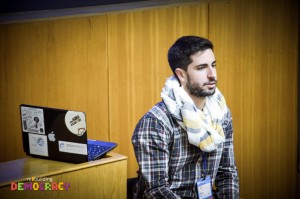
Having a Secretariat is something that AEGEE approved in the past and I would want to see implemented, so the technical parts as the finances, staff management or IT can be dealt by professionals, and not put the burden on volunteers, who if they have the wish to learn these technical areas, a system of job shadowing can be built up. People can also be trained to apply for grants and ensure the financial stability of the organisation.
You can read his candidature here, the first part of his interview here and his portfolio article here.
Edited by Erika Bettin, AEGEE-Verona


